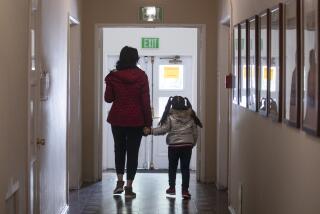No Guarantees in Fleeing Abuse
- Share via
In the end, safety is elusive.
Even when a battered wife finds the courage and opportunity to flee to a shelter, as Margarita Sosa did, danger still lurks, domestic violence counselors said Monday.
“There is no perfect way to protect people,” said Isabel Melloni of Latino Service Center in Santa Ana, which provides domestic violence counseling.
Batterers by definition are unpredictable, so there is no way to foretell how they will react after the battered woman takes action, said Betty Fisher, director of Haven Hills, a shelter in the San Fernando Valley.
“It sounds like [Margarita Sosa] did the right thing,” Fisher said. “Tragically, that’s no guarantee that she will come out of it OK, or that her family will.”
Several counselors expressed concern that the Sosa case might deter other women from leaving abusive relationships, even though it is rare for a batterer to vent his violence on the victim’s extended family, as Javier A. Sosa did Sunday.
Margarita Sosa did the right thing by going to the relative safety of a shelter, they all agreed.
Although no action can guarantee security in such cases, there are a few additional steps families can take to discourage batterers, they said.
Police should be called when the woman flees, so that the batterer will be arrested and spend at least some time in jail in the volatile first days and then get channeled into a batterer’s counseling program, said Melloni of Latino Service Center, which runs a court-approved, 52-week program.
Further, if the woman’s extended family has been threatened or feels in danger, relatives should obtain restraining orders or go into hiding as well, said Froda Brotemarkle, program director at Women’s Transitional Living Center in Orange.
“It’s that [first] 72 hours that’s the real scary time,” Brotemarkle said. The batterer remains dangerous after that, she said, “but he will change his tactics.”
Los Angeles sheriff’s officials say they were never summoned to the Sosa house in Commerce, even when the wife fled with their two children for the shelter on Friday. It was not known whether restraining orders were sought. Margarita Sosa contacted her family Friday, telling them she was in a safe place but not saying where for her protection, authorities said.
Still, crime logs are littered with cases of husbands hunting down their estranged wives, despite restraining orders to keep them away.
“Like I say all the time, a piece of paper doesn’t stop a bullet,” said Orange County Superior Court Judge Nancy Pollard, who handles family law cases. “I tell them they also have to be wise.”
Though Margarita Sosa did the right things for her family, she probably is feeling tremendous guilt over the slayings, counselors said.
“This woman ran away from the situation where she was being victimized; she finally takes action, and look what happens. I really feel for this woman,” Brotemarkle said. “She is going to need a lot of therapy and a lot of support.”
This is especially true in the Latino culture, which emphasizes that it is a wife’s duty to stay with her husband, Melloni said. “She is going to think, ‘I should have taken it [the abuse]. It was my responsibility.’ ”
The first big step battered women must take is realizing that the batterer is responsible for his own behavior, she said.
And Margarita Sosa also must remember that she acted to protect her life and the lives of her children.
“The reality is,” Brotemarkle said, “she was in just as much danger with him as her family members were when she left.”
More to Read
Sign up for Essential California
The most important California stories and recommendations in your inbox every morning.
You may occasionally receive promotional content from the Los Angeles Times.













